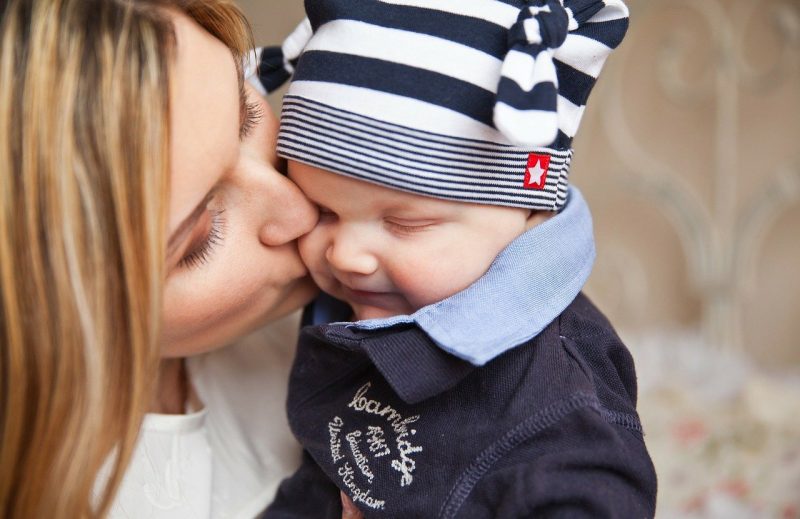Seeing your baby pull their hair can be a bit distressing. They grab handfuls and rip their hair out while simultaneously screaming. It can also be concerning.
Some babies do this out of frustration or anger. Other’s may slowly pull their hair out in little pieces. There are quite a few things that can make your baby pull out their hair.
In this article
Pay Attention To When Your Baby Is Pulling Out Hair
In order to determine the reason why your little one is ripping out their hair, you need to pay attention to when they do it. For example, my grandson does this.
He only does it when he is tired, though. He’ll twirl his hair in his fingers. He plays with it. Then, he occasionally pulls it. This is the only time that he pulls his hair, so we were able to determine that he does it when he is tired.
Paying attention to what is going on around you when your little one starts pulling out their hair can tell you why they are doing it. This might not stop the behavior, but it will give you clues as to what’s going on with your baby.
Also, Pay Attention To What Hair Your Baby Is Pulling Out
Some babies will only pull out the hair on their head while they are playing with their hair, like the grandbaby. Other little ones might pull out their eyelashes or eyebrows.
Where your baby is pulling out hair can give you an indication as to whether there is an underlying disorder, and why your little one is pulling out their hair.
Reasons Your Baby Pulls His Hair Out
View in gallery
Now that you know when your little one is pulling their out, and what hair is being pulled, you can determine what the reason might be.
Once you find the underlying cause, you can determine whether you can prevent the behavior and whether you need to call the pediatrician.
Trichotillomania (Also Called Trich)
Trichotillomania in babies can also be referred to as baby trich. This is a disorder that makes a person feel compelled to pull out their own hair.
It could be their eyelashes, their eyebrows, or the hair on the head. It is typically placed in with disordered related to OCD. It’s important to note that sometimes OCD treatments help, and sometimes they don’t.
They Don’t Understand Cause And Effect Yet
When babies are younger, they do not understand cause and effect. For example, they don’t understand that pulling their hair is what’s hurting them.
Babies explore things through touch. This involves touching things and pulling on things. They might pull on their ear when they first discover it. The same thing can happen with their hair.
Baby Hair Pulling Is A Sign Of Stress
When babies are stressed, they might literally rip their hair out. This is because they are stressed, overstimulated, anxious, or just plain irritable.
For example, consider the grandbaby doing this when he’s tired. Your little one might have a dirty diaper, be sleepy or feel hungry. They cannot communicate effectively at such a young age, so this is their way of trying to tell you something.
Double-check to make sure that your little one is fed and changed. If they are tired, lay them down. Babies that are overstimulated can be moved into a quiet, calm room in the house to help them de-stress.
If you notice that your baby frequently does this around bedtime, try putting them to bed a little earlier. This gives him time to fall asleep before the hair-pulling starts, which can help curb the behavior.
Hair Pulling Is Frequently Seen With Thumb Sucking
When this behavior is a self-soothing behavior, such as when a baby is stressed or tired, it’s usually seen in combination with thumb sucking.
For example, when the little one is tired, he’ll suck his thumb with one hand and play with his hair with the other hand.
He might twirl it, run it through his fingers or pull it. It’s simply self-soothing. The solution is the same as it is for when a baby is stressed.
What To Do If Your Baby Is Pulling His Hair Out
View in gallery
If your little one is pulling their hair out, regardless of whether it is their eyebrows or the hair on their head, there are certain ways you can deal with that. There are also a few things you probably shouldn’t do in this situation.
Don’t Use Negative Consequences
When you’re used to smacking a hand, etc. when your little one does something, it can be hard not to do the same. However, this can encourage the behavior if they find that it gets your attention.
It also won’t help them stop the behavior long term. This type of reaction also assumes that they can stop the behavior. If your little one has OCD, they might not be able to help themselves. Other types of solutions can be more effective.
Don’t Shave Their Hair Off
Another solution that seems great in theory is to simply shave their head. If you have a little boy that only pulls out the hair on their head, shaving it will stop the behavior.
However, most little ones will start to pull their hair again once it grows back in. Or, they might simply start pulling other hair out, like their eyebrows.
Do Nothing If You Can
It can be hard to watch your little one rip their hair out tiny piece by tiny piece, but you need to ignore it if possible.
Make a mental note of what’s going on, and what they are doing, when they pull their hair out. This can help you identify the underlying cause.
Pulling their hair might also be a phase. Some babies will do this for a few weeks, and then suddenly stop. Parents will never see them do it again.
No one knows what brings on this phase, or why babies go through it, but it does happen.
If you start coming up with solutions right away, you might create more problems, like teaching them that it’s an effective way to get attention or get what they want.
Medication Is Unnecessary
Although trich is often described as a form of OCD, it remains a controversial topic. Some say that it is a form of Obsessive-Compulsive Disorder, and others say that it is not.
Either way, medications that are typically effective for children with OCD don’t seem to help trich. They are also not safe for babies.
Make It Impossible For Them To Pull Their Hair
Most professionals recommend cognitive behavior therapy for this situation. This might involve putting socks or mittens on their hands, which will make it impossible for them to pull their hair out.
Putting a hat on is another great idea. Most babies will get frustrated at first, but will slowly be able to stop the behavior when not wearing the mittens.
Provide Other Sensory Stimulation
- Skip Hop Zoo plush characters featuring a textured surface bandana teething toy
- A soft baby toy and teether filled with textures, patterns and sounds Little hands stay active as baby explores rattles, crinkles and more.
- Bandana Buddies are the perfect infant toy for multi-sensory play, this cute companion is ideal for fun at home or-on-the-go.
- This colorful characters soft bandana teether detaches for mom to wear around her wrist for quick access.
- PVC-free, Phthalate-free
Prices pulled from the Amazon Product Advertising API on:
Product prices and availability are accurate as of the date/time indicated and are subject to change. Any price and availability information displayed on [relevant Amazon Site(s), as applicable] at the time of purchase will apply to the purchase of this product.
Babies need sensory play. When they don’t get it, they seek that stimulation through other means. Some babies that pull their hair out need more sensory stimulation or a different kind.
Along with preventing them from being able to pull their hair, you’ll need to provide that via other means. Some great ideas include:
- Letting them play with a brush with bristles
- Textured pieces of cloth
- A plushie with different textures on it
These are great ways to help provide the sensory play that your baby is craving. They can also serve as a substitute for hair pulling in babies.
Taking away behavior that you don’t want to see usually works out better for both parents and babies if it is substituted with another behavior.
Soothe Babies That Are Pulling Their Hair
If you notice that your little one is doing this because they are stressed, soothe them. Babies are encouraged to have self-soothing behaviors, but that doesn’t mean that parents can’t or shouldn’t soothe their babies.
In fact, babies need their parents to calm them down at times. Hold your little one and sing them a song. Rock them. Pat their back. Whatever soothing method you use, use it if your baby is pulling their hair because they are anxious.
In Conclusion
Babies that pull their hair are usually stressed and self-soothing or they found out they can pull their hair. Trich is a possibility, but this is rare.
Instead of rushing off for therapy, watch your little one to determine when and why they pull hair. Contact your pediatrician if you’re concerned.






